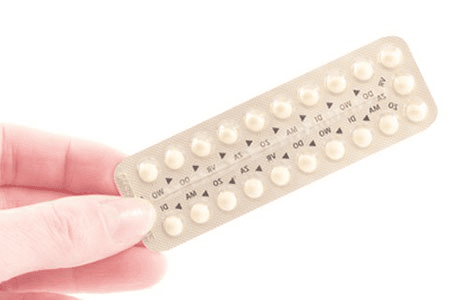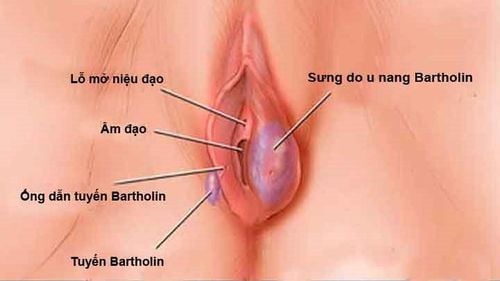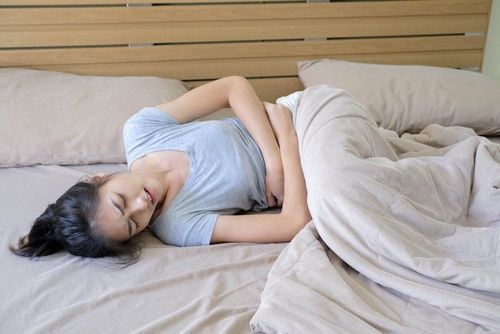This is an automatically translated article.
The article was professionally consulted with Specialist II, Doctor Nguyen Thi Minh Tuyet - Obstetrician and Gynecologist - Department of Obstetrics and Gynecology - Vinmec Central Park International General Hospital.Amenorrhea (loss of menstruation) is one of the gynecological conditions. Depending on the cause of amenorrhea, patients have different treatment options. If not treated promptly, amenorrhea will affect a woman's reproductive health.
1. Amenorrhea
Amenorrhea is the absence of menstruation in women from one to many menstrual periods. Amenorrhea can occur in women who have not menstruated for at least 3 consecutive menstrual periods, as well as girls who have reached puberty but have not had a period. There are two types of amenorrhea:Primary amenorrhea occurs in girls at the age of 16, reaching puberty but not menstruating. Secondary amenorrhea is a condition in which a woman has had a normal menstrual cycle, but suddenly stops menstruating. The confirmed time as secondary amenorrhoea in regular menstruating women is 3 consecutive months without a period, in women with irregular menstrual periods is 6 consecutive months without a period.

2. Causes of amenorrhea
The most common cause of amenorrhea is pregnancy. In addition, the causes of amenorrhea can be problems with the reproductive organs, endocrine glands, side effects of medications, when treating these conditions will resolve the amenorrhea.Natural amenorrhea: During the normal course of life, a woman may experience amenorrhea for natural reasons, such as:
Pregnancy Breastfeeding Menopause Birth control pills : Some Women taking oral contraceptives can cause missed periods. Even after stopping birth control pills, it can take some time before regular ovulation and periods return. Birth control pills that are injected or implanted can also cause amenorrhea. Drug effects: Certain medications can stop your menstrual cycle, including some: antipsychotics, cancer chemotherapy, antidepressants, blood pressure medications, allergy medications Lifestyle: Sometimes lifestyle factors contribute to amenorrhea, e.g. Low body weight: Too low body weight - about 10% below normal weight - disrupts many hormonal functions in the body. body, has the ability to ovulate. Women with an eating disorder, such as anorexia or bulimia, will lose their periods because of these unusual hormonal changes. Excessive exercise: Women who participate in activities that require rigorous training, intense exercise, may find their menstrual cycle will be disrupted. Several factors combine to contribute to loss of time in athletes, including low body fat, stress, and high energy expenditure. Stress: Mental stress can temporarily alter the activity of the hypothalamus - an area in the brain that controls hormones that regulate a woman's menstrual cycle. This can cause ovulation and missed periods. Regular menstrual cycles usually resume after your stress subsides. Hormonal Imbalances: Many medical conditions can cause hormonal imbalances, including: Polycystic ovary syndrome (PCOS) which causes relatively high and sustained hormone levels, rather than fluctuating levels. seen in the normal menstrual cycle. Hypothyroidism: An overactive thyroid (hyperthyroidism) or an underactive thyroid (hypothyroidism) can cause menstrual irregularities, including amenorrhea. Pituitary Tumor: A (benign) tumor in a woman's pituitary gland can interfere with the hormonal regulation of menstruation. Early menopause: Menopause usually begins around age 50. But, for some women, premature decline in ovarian function can lead to early menopause before age 40. Structural problems: Problems with the sex organs can also cause amenorrhea such as: Uterine scarring: Asherman's syndrome is a condition in which scar tissue builds up in the lining of the uterus, causing adhesions, which can lead to uterine bleeding. can occur after curettage and curettage (D&C), cesarean section, or treatment for fibroids. Uterine scarring prevents the normal buildup and shedding of the uterine lining. Lack of reproductive organs: Sometimes problems arise during fetal development resulting in a baby girl being born without a major part of her reproductive system, such as a uterus, cervix or vagina. Because the reproductive system of the female is not developed normally, even though the endocrine system is normal, it is still not possible to have a menstrual cycle. Structural abnormalities of the vagina: A blockage of the vagina can stop menstrual bleeding. A diaphragm blocks menstrual blood flow from the uterus and cervix Risk factors: Other factors that may increase a woman's risk of amenorrhea include: Family history: If these If another woman in your family has amenorrhea, you may have inherited this history, Eating disorders: If a woman has an eating disorder such as anorexia or bulimia, there is an increased risk of amenorrhea. Physical training: Rigorous exercise can increase the risk of amenorrhea. Many people subjectively think that amenorrhea is not dangerous, but in fact the complications of amenorrhea can have long-term consequences for a woman. If a woman doesn't ovulate and menstruate, she won't be able to get pregnant. At the same time, when amenorrhea due to low estrogen levels can also increase the risk of osteoporosis.
Trắc nghiệm: Bạn có hiểu đúng về dấu hiệu mang thai sớm?
Các dấu hiệu mang thai sớm không phải chỉ mỗi trễ kinh mà còn có rất nhiều dấu hiệu khác như xuất huyết âm đạo, ngực căng tức,… Điểm xem bạn biết được bao nhiêu dấu hiệu mang thai sớm thông qua bài trắc nghiệm này nhé!
3. Symptoms
The main sign of amenorrhea is the absence of a period. Depending on the cause of amenorrhea, a woman may experience other signs or symptoms along with the absence of menstruation, such as:Nipple discharge Hair loss Headache Changes in vision Bone pain Women who see abnormal signs such as three consecutive menstrual periods do not appear, reach puberty but have not had a period... go to the hospital immediately to receive the advice of a doctor.

4. Treatment
Depending on the cause, the patient has different treatment options:Birth control pills or other hormone therapy can stabilize the menstrual cycle In the case of congenital amenorrhea, the patient has You may be prescribed specific medication by your doctor, and you may even need surgery. Amenorrhea caused by polycystic ovary syndrome requires weight loss with diet and exercise. Medications such as diabetes metformin may also be prescribed. Some drugs and surgical methods are indicated for amenorrhoea such as:
Polycystic ovary treatment drugs Surgery to remove scar tissue in the uterus Surgery to remove benign pituitary tumors Especially to avoid amenorrhea and increase efficiency for the treatment of amenorrhea, patients need to have a suitable lifestyle such as: Keep a healthy weight and combine a reasonable diet, do not exercise too much or exercise too much. There is no suitable coach, periodical medical examination...
Vinmec International General Hospital provides female customers with a package of gynecological examination and screening. This examination package helps customers to detect inflammatory diseases early, thereby treating the disease easily and inexpensively. At the same time, Vinmec's gynecological examination service package also helps screen and detect cervical cancer early.
Please dial HOTLINE for more information or register for an appointment HERE. Download MyVinmec app to make appointments faster and to manage your bookings easily.
Article reference source: mayoclinic.org, webmd.com













